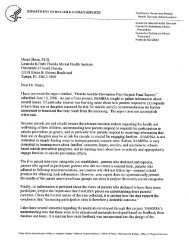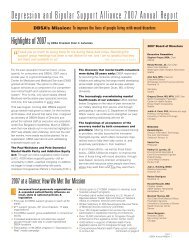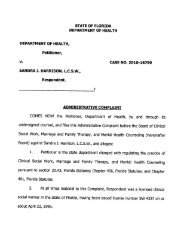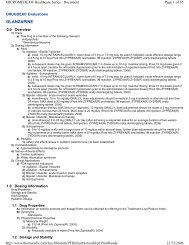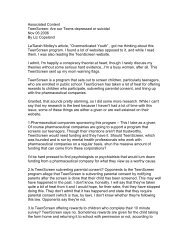Fierce opposition arises to mental health screening ... - PsychSearch
Fierce opposition arises to mental health screening ... - PsychSearch
Fierce opposition arises to mental health screening ... - PsychSearch
Create successful ePaper yourself
Turn your PDF publications into a flip-book with our unique Google optimized e-Paper software.
<strong>Fierce</strong> <strong>opposition</strong> <strong>arises</strong> <strong>to</strong> <strong>mental</strong> <strong>health</strong> <strong>screening</strong> in schools<br />
http://www.post-gazette.com/pg/05261/573055.stm<br />
Page 1 of 3<br />
9/19/2005<br />
Pittsburgh, Pa.<br />
Monday, Sept. 19, 2005<br />
Health & Science<br />
Previous Articles<br />
Health<br />
Science<br />
Environment<br />
<strong>Fierce</strong> <strong>opposition</strong> <strong>arises</strong> <strong>to</strong> <strong>mental</strong> <strong>health</strong><br />
<strong>screening</strong> in schools<br />
Sunday, September 18, 2005<br />
By Karen MacPherson, Pittsburgh Post-Gazette<br />
WASHINGTON -- Back in 2003, a federal commission created by<br />
President Bush recommended improving and expanding <strong>mental</strong> <strong>health</strong><br />
programs in schools <strong>to</strong> provide help as early as possible <strong>to</strong> students with<br />
learning problems or those who might turn violent or disruptive.<br />
The commission highlighted one means of early diagnosis, the Columbia<br />
University "TeenScreen" program, that allows students -- with parental<br />
permission -- <strong>to</strong> get a <strong>mental</strong> <strong>health</strong> "check-up" via a computer-based<br />
questionnaire before graduating from high school.<br />
The commission's 86-page report included this suggestion among a long<br />
list of recommendations <strong>to</strong> improve the U.S. <strong>mental</strong> <strong>health</strong> system. The<br />
report attracted little attention outside <strong>mental</strong> <strong>health</strong> circles.<br />
But over the past two years, a cottage industry of fiery <strong>opposition</strong> has<br />
grown up around the proposal <strong>to</strong> expand <strong>mental</strong> <strong>health</strong> programs in the<br />
schools and has become a popular rallying cry for conservatives who see<br />
it as unwarranted government intervention in family life.<br />
Opponents of school-based <strong>mental</strong> <strong>health</strong> programs point <strong>to</strong> parents who<br />
say their children have been misdiagnosed with problems such as<br />
attention deficit hyperactivity disorder (ADHD) and forced <strong>to</strong> take<br />
medication under pressure from school officials.<br />
To these parents, the commission suggestion <strong>to</strong> "improve and expand''<br />
school <strong>mental</strong> <strong>health</strong> programs is the first, inexorable step <strong>to</strong>ward<br />
manda<strong>to</strong>ry school <strong>mental</strong> <strong>health</strong> <strong>screening</strong> for all students, and<br />
manda<strong>to</strong>ry medication for many, despite repeated assurances by<br />
commission members, school officials and congressional experts that<br />
this won't happen.<br />
Led by groups like Ablechild.org and EdAction, these parents want <strong>to</strong><br />
prohibit schools from having anything <strong>to</strong> do with the <strong>mental</strong> <strong>health</strong> of<br />
their students, saying it is the job of parents <strong>to</strong> ensure their children's<br />
well-being.<br />
As a first step, the groups are pushing Congress <strong>to</strong> pass legislation,<br />
sponsored by Rep. Ron Paul, R-Tex., and supported by House Majority<br />
Leader Tom DeLay, R-Texas, <strong>to</strong> prohibit any federal funding for <strong>mental</strong><br />
<strong>health</strong> <strong>screening</strong> of students without the written consent of their parents.
http://www.post-gazette.com/pg/05261/573055.stm<br />
9/19/2005<br />
<strong>Fierce</strong> <strong>opposition</strong> <strong>arises</strong> <strong>to</strong> <strong>mental</strong> <strong>health</strong> <strong>screening</strong> in schools<br />
"If [this legislation] is passed, it will prevent wasteful and potentially<br />
devastating federal funding while safeguarding the informed consent<br />
rights of all parents in what is a most serious matter -- their children's<br />
<strong>health</strong> and safety," said Patricia Weathers, president and co-founder of<br />
Ablechild.org.<br />
Page 2 of 3<br />
The educa<strong>to</strong>rs and medical professionals on the other side of the debate<br />
agree parental consent should be required for <strong>screening</strong>s. But they also<br />
think it's worth studying the idea of promoting voluntary <strong>screening</strong>s <strong>to</strong><br />
get help for children who need it as early as possible.<br />
"There is this curious coalition of people who are concerned about stuff<br />
that we didn't recommend, and are making a big noise about it,'' said<br />
Michael Hogan, direc<strong>to</strong>r of the Ohio Mental Health Department and<br />
chairman of what was then called the New Freedom Commission.<br />
"The core thing that the commission was concerned about is the fact that<br />
a lot of these <strong>mental</strong> <strong>health</strong> problems are pretty clearly problems of<br />
childhood and adolescent onset.... Added <strong>to</strong> this is the fact that most<br />
children never get <strong>to</strong> see a <strong>mental</strong> <strong>health</strong> specialist.<br />
"The funda<strong>mental</strong> logic of what the commission said is that we should<br />
take steps <strong>to</strong> facilitate access <strong>to</strong> care where children are.''<br />
The debate over school <strong>screening</strong>s is just part of a larger discussion over<br />
the role schools should play in ensuring children's <strong>mental</strong> heath. Many<br />
educa<strong>to</strong>rs point <strong>to</strong> a clear connection between <strong>mental</strong> <strong>health</strong> and<br />
academic achievement.<br />
"There are a whole slew of intra-personal variables that contribute <strong>to</strong> a<br />
kid's ability <strong>to</strong> learn and are heavily related <strong>to</strong> their academic success,''<br />
said Stacy Skalski, public policy direc<strong>to</strong>r for the National Association of<br />
School Psychologists.<br />
"There are also inter-personal variables. Kids don't come in<strong>to</strong> the world<br />
knowing how <strong>to</strong> relate <strong>to</strong> others. They need <strong>to</strong> learn that.''<br />
Bruce Hunter, a veteran policy official with the American Association of<br />
School Administra<strong>to</strong>rs, said it's clear "the education business is <strong>to</strong>ugh<br />
enough without getting in<strong>to</strong> the <strong>mental</strong> <strong>health</strong> business.<br />
"But if a kid is going <strong>to</strong> beat the hell out of other kids regularly, and is<br />
disrupting the classroom, that's a child that needs some <strong>mental</strong> <strong>health</strong><br />
assistance. One of the things that our members have expressed is a rising<br />
concern about students' <strong>mental</strong> <strong>health</strong>, and the ability <strong>to</strong> get them help<br />
when they have a problem,'' Hunter said.<br />
A complicating fac<strong>to</strong>r is that the debate over school <strong>mental</strong> <strong>health</strong><br />
problems has become enmeshed in the vehement <strong>opposition</strong> of some<br />
people <strong>to</strong> medicating children for depression, hyperactivity and other<br />
problems. These opponents point <strong>to</strong> the nasty potential side effects of<br />
some commonly prescribed drugs, including suicide, and argue that they<br />
simply aren't safe for children.<br />
Hogan and others supporters of school <strong>mental</strong> <strong>health</strong> programs agree
http://www.post-gazette.com/pg/05261/573055.stm<br />
9/19/2005<br />
<strong>Fierce</strong> <strong>opposition</strong> <strong>arises</strong> <strong>to</strong> <strong>mental</strong> <strong>health</strong> <strong>screening</strong> in schools<br />
that more long-term testing should be done on antidepressants and other<br />
emotion-altering drugs prescribed for children and teens.<br />
Page 3 of 3<br />
"We [commission members] recommended that the scientists and<br />
regula<strong>to</strong>ry officials get on <strong>to</strong>p of the safety issue,'' Hogan said.<br />
Weathers, of Ablechild.org, is among those who believe more attention<br />
should be paid <strong>to</strong> children's nutrition and behavior management, instead<br />
of "being so quick <strong>to</strong> prescribe a drug." Her group supports legislation,<br />
sponsored by Rep. John Kline, that would prohibit schools from<br />
requiring parents <strong>to</strong> have their children medicated <strong>to</strong> attend classes.<br />
Kline's bill would expand protections in the Individuals with Disabilities<br />
Act, which prohibited schools from requiring special education students<br />
<strong>to</strong> take certain medications, <strong>to</strong> all students. The bill also would cover<br />
more types of medication than in the disability law.<br />
Weathers said she was pressured in<strong>to</strong> medicating her then first-grade son<br />
after a school psychologist diagnosed him with attention deficit disorder.<br />
The medication eventually made him psychotic, but when she s<strong>to</strong>pped<br />
giving it <strong>to</strong> him the school reported her <strong>to</strong> state children protective<br />
officials for child abuse, she said.<br />
A lawsuit brought by Weathers against school officials is pending; her<br />
son, meanwhile, is now 15 and "doing fine," she said.<br />
"We have 1,000 s<strong>to</strong>ries like this,'' Weathers said. "Our group is not<br />
saying that children don't have attention or behavior problems. Some<br />
kids do. But why should we force parents <strong>to</strong> drug their children so they<br />
can attend school?"<br />
(Karen MacPherson can be reached at kmacpherson@nationalpress.com or<br />
1-202-662-7075.)<br />
Master's in Counseling<br />
Mental Health or School Guidance<br />
Counseling - Convenient Hours Avail<br />
Research Mental Health<br />
Mental <strong>health</strong> research articles, studies,<br />
news, and journals.<br />
Ads by Goooooogle<br />
E-mail this s<strong>to</strong>ry<br />
Print this s<strong>to</strong>ry<br />
Search | Contact Us | Site Map | Terms of Use | Privacy Policy | Advertise | About Us | Help | Corrections<br />
Copyright ©1997-2005 PG Publishing Co., Inc. All Rights Reserved.



